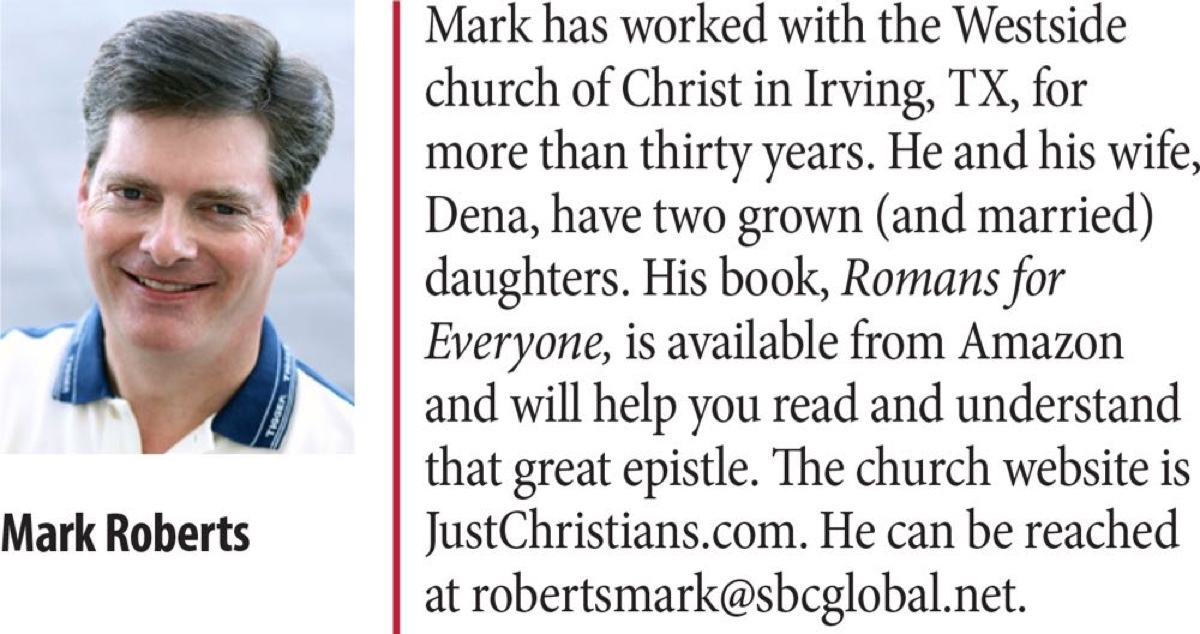By Mark Roberts
Synopsis: God has a faithful group that He uses. . . and we can be part of it. However, being in that remnant isn’t always easy! Courage and commitment are required.
Somehow the idea of a “remnant” almost feels second rate. “We only have a few remnants left,” might mean the store is out of its best goods. Yet, for Paul, it was an exciting idea that played across the stage of all Scripture: the faithful few through whom God continues to work. For Paul, it wasn’t about being “leftovers,” but being at the center of God’s plans. That is why we want to understand the remnant in Romans 11. Paul says “there is a remnant, chosen by grace” (v. 5), and we want to be part of that remnant.
Romans 11 is a climactic moment in Paul’s writing to the church in Rome. This is a church experiencing division and strife along racial lines. Paul deals with much of this by reminding Jews and Gentiles that they are so alike. For example, they are all sinners (chs. 1-3), and all are saved by grace (ch. 4), and all have become new in Christ through baptism (ch. 6). Even so, Paul knows there are simmering and smoldering attitudes in Rome. A Jewish Christian might consider Gentiles as almost second-class Christians, thinking “Gentiles read our Bible and follow our Messiah—who is a Jew!” Gentile brothers might respond in resentment by saying, “You Jews didn’t pursue God by faith. He has rejected you and replaced you with us!” Paul answers this problem by saying that God is certainly not done with all Jews. After all, Paul says, I am a Jew (11:1)! Moreover, the inspired apostle argues, God will never be done with true Jews. There was a remnant, a small group faithful to God, even during Elijah’s time (vv. 2-4). Those 7,000 stand for all time to remind us that God always has a faithful group with whom He works to accomplish His purpose (v. 5). There are three implications for our Roman brethren, and for us, from these truths.
Why didn’t true belief simply vanish during the time of Elijah when God’s prophets were killed and His altars demolished? Because God sustained the faithful. In His grace and mercy, He protected them. For example, God miraculously fed Elijah at the brook Kidron by means of ravens (1 Kings 17:6). What happened with the others? We aren’t told, but God assures Elijah he is not alone! God had made incredible promises to Abraham, and those promises would not be exterminated. The key is for us to realize that neither Elijah nor the 7,000 deserved that. They could have been swept away in the furious storm of sin and idolatry that Ahab and Jezebel unleashed. Faithfulness doesn’t mean that God owes us anything. Nevertheless, by His grace, He maintains His commitment to Himself and His promises, and He chose to do that through a small group of faithful Israelites that He preserved.
This is an excellent place for American Christians to stop congratulating themselves on the size of our buildings, the effectiveness of our YouTube videos and live streaming, and be reminded: we are here by God’s grace. The freedoms we enjoy in this country have empowered us to build strong and thriving congregations. Yet it is clear that the forces of darkness would gladly sweep us away. Why hasn’t that happened yet? With so many arrayed against God’s people—the media, the courts, the legislature, and more—how are we still here? We are but a remnant. Yet, we are here, Paul reminds us, because of God’s amazing grace.
Perhaps few places in Scripture give us a glimpse of the joining of human will and divine sovereignty like Romans 11. Yes, God had determined that faith would not be obliterated from the earth. Who would carry the light of His knowledge forward? Who would be in the group that God used to keep the promises to Abraham alive? The answer is simple: those who chose not to bow the knee to Baal. To be sure, God does not need faithful people to accomplish His will. He can (and has) used unbelievers. Yet, God’s preference is to work with those who want to work with Him! That does not mean such folks aren’t sinners and don’t need grace. Of course not. The 7,000 Paul references in Romans 11 were still sinners needing forgiveness. However, they were the kind of people who wanted to be on God’s side. They wanted to do right. God blesses that, and God uses that. They were true Israelites. They had a heart for God. God chose them, and they chose God.
From a societal standpoint, life became complicated and difficult for Jews (such as Paul) who believed in Christ and obeyed the gospel. They had chosen Jesus of Nazareth. That meant persecution and attacks—from their own countrymen! It was hard for the 7,000 to refuse Baal, and it was hard for those New Testament Christians in Rome to be faithful. In acknowledging this truth—that our choice to serve God can bring hardship—we are brought to a third truth about being in God’s remnant. . .
The Jewish religion had long known special status under Roman law. They may have loathed the Jews, but the Romans knew not to trifle with their religious rites. There was no idol to Caesar in their temple, and their synagogues were exempt from laws about secret societies. Jews were allowed to send the temple tax to Jerusalem each year, instead of Rome. Judaism was a legal religion.
Christianity was not. For a while, it operated under the umbrella of Judaism, but the Jews who rejected Jesus worked hard to separate themselves from Christianity (Acts 18:2). By the time Paul writes Romans, Jewish disciples are having to make hard decisions about who they are for what they stand. Maybe that’s why Paul is so concerned about the church at Rome. He knows those Jewish Christians need their Gentile brothers! Thus, he calls them to be faithful to Christ, to be part of the remnant, but he also calls them to unity and care for one another. Instead of disdaining one another, Jew and Gentile needed to help each other—something Paul develops at much greater length in Romans 14-15.
Somehow all of this feels like deja vu! Many laws and special privileges have protected Christianity in the United States of America. Yet, we see those evaporating. More and more Christians will have to decide if they want to be citizens of the Kingdom or citizens of America. To refuse to bow the knee will be costly. There will be persecution and ostracism. Of course, it will be worth it as God works through the faithful, the true Israelites, to accomplish His everlasting purposes. Yet, that doesn’t mean it will be easy, and we will need our brethren to sustain and help and comfort each other. When you are the majority, you fit into society with no troubles. When you are but a remnant, you need all the help and support you can get because you will be persecuted!
God has a plan. In His grace, His plan always includes those who want to be part of His work and who set themselves up against the majority of society because they believe in Him and His Word. What about you and me today? Are we ready to be part of God’s faithful remnant? Are we thankful for His grace, and are we ready to refuse to bow the knee? Then let us pull ranks tight with our brothers and sisters as we continue to be lights in this ever-darkening world for Jesus Christ!
Mark has worked with the Westside church of Christ in Irving, TX, for more than thirty years. He and his wife, Dena, have two grown (and married) daughters. His book, Romans for Everyone, is available from Amazon and will help you read and understand that great epistle. The church website is JustChristians.com. He can be reached at robertsmark@sbcglobal.net.


